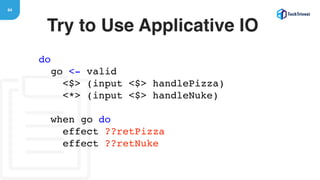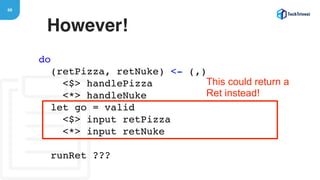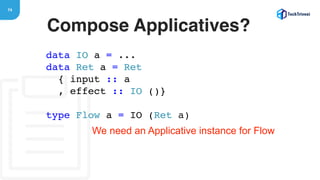Supercharged imperative programming with Haskell and Functional Programming
- 1. SUPERCHARGED IMPERATIVE PROGRAMMING WITH HASKELL AND FP ANUPAM JAIN
- 2. 2 Hello!
- 3. 3 ❑ HOME PAGE https://fpncr.github.io ❑ GETTOGETHER COMMUNITY https://gettogether.community/fpncr/ ❑ MEETUP https://www.meetup.com/DelhiNCR-Haskell-And- Functional-Programming-Languages-Group ❑ TELEGRAM: https://t.me/fpncr Functional Programming NCR
- 4. 4 ❑Type safety. Eliminates a large class of errors. ❑Effectful values are first class ❑Higher Order Patterns ❑Reduction in Boilerplate ❑Zero Cost Code Reuse Overview
- 5. 5 ❑Order of operations matters ❑Contrast with functional, where the order of operations does not matter. Define “Imperative”
- 6. 6 write "Do you want a pizza?” if (read() == "Yes") orderPizza() write "Should I launch missiles?” if (read() == "Yes") launchMissiles() Imperative is simple
- 7. 7 write "Do you want a pizza?” if (read() == "Yes") orderPizza() write "Should I launch missiles?” if (read() == "Yes") launchMissiles() Imperative is simple You REALLY DON’T want to do these out of order
- 8. 8 do write "Do you want a pizza?" canOrder <- read When (canOrder == "Yes") orderPizza write "Should I launch missiles?" canLaunch <- read When (canLaunch == "Yes") launchMissiles Functional?
- 9. 9 do write "Do you want a pizza?" canOrder <- read when (canOrder == "Yes") orderPizza write "Should I launch missiles?" canLaunch <- read when (canLaunch == "Yes") launchMissiles Functional? Haskell
- 10. 10 write "Do you want a pizza?" >>= _ -> read >>= canOrderPizza -> if (canOrderPizza == "Yes") then orderPizza else pure () >>= _ -> write "Should I launch missiles?" >>= _ - > read >>= canLaunchMissiles -> if (canLaunchMissiles == "Yes") then launchMissiles else pure () Functional?
- 11. 11 plusOne = x -> x+1 add = x -> y -> x+y A bit of syntax Lambdas
- 12. 12 (>>=) = effect -> handler -> ... A bit of syntax Operators
- 13. 13 read >>= canOrderPizza -> ... A bit of syntax Infix Usage
- 14. 14 write "Do you want a pizza?" >>= _ -> read >>= canOrderPizza -> if (canOrderPizza == "Yes") then orderPizza else pure () One At a Time
- 15. 15 write "Should I launch missiles?" >>= _ -> read >>= canLaunchMissiles -> if (canLaunchMissiles == "Yes") then launchMissiles else pure () One At a Time
- 16. 16 handlePizza >>= _ -> handleMissiles Together
- 17. 17 handlePizza >>= _ -> handleMissiles Together
- 18. 18 handlePizza :: IO () handlePizza = do write "Do you want a pizza?" canOrderPizza <- read if (canOrderPizza == "Yes") then orderPizza else pure () Types This entire block 1. Is Effectful 2. Returns ()
- 19. 19 Effectful Logic Pure Logic Outside World
- 20. 20 ❑Can’t mix effectful (imperative) code with pure (functional) code ❑All branches must have the same return type Types
- 21. 21 SideEffects!!
- 22. 22 “Haskell” is the world’s finest imperative programming language. ~Simon Peyton Jones (Creator of Haskell)
- 23. 23 So How is Haskell The Best Imperative Programming Language?
- 24. 24 ❑We don’t launch nukes without ordering pizza Change Requirements
- 25. 25 handlePizza :: IO Bool handlePizza = do write "Do you want a pizza?" canOrderPizza <- read if (canOrderPizza == "Yes") then orderPizza >> pure true else pure false Types
- 26. 26 do pizzaOrdered <- handlePizza if pizzaOrdered then handleMissiles else pure () With Changed Requirements
- 27. 27 ❑Ask the user a bunch of questions ❑Then perform a bunch of actions Reorder?
- 28. 28 Must Rearchitect do write "Do you want a pizza?" canOrder <- read write "Should I launch missiles?" canLaunch <- read when (canOrder == "Yes") orderPizza when (canLaunch == "Yes") launchMissiles
- 29. 29 Must Rearchitect do write "Do you want a pizza?" canOrder <- read write "Should I launch missiles?" canLaunch <- read when (canOrder == "Yes") orderPizza when (canLaunch == "Yes") launchMissiles But we have lost the separation between Ordering pizza and Launching nukes
- 30. 30 We Need ❑Define complex flows with user input and a final effect to be performed ❑To compose these flows without boilerplate ❑Be able to run the final effects together at the end of all user input
- 31. 31 Desired Abstraction handlePizza = ... handleNukes = ... do handlePizza handleNukes We ask questions in this order, but the final effect of ordering pizza and launching nukes should only happen together at the end
- 32. 32 Must Rearchitect handlePizza = do write "Do you want a pizza?" canOrder <- read return $ when (canOrder == "Yes") orderPizza
- 33. 33 Must Rearchitect handlePizza :: IO (IO ()) handlePizza = do write "Do you want a pizza?" canOrder <- read return $ when (canOrder == "Yes") orderPizza Return value is a CLOSURE Captures `canOrder`
- 34. 34 Must Rearchitect handleNukes :: IO (IO ()) handleNukes = do write “Should I launch nukes?" canLaunch <- read return $ when (canLaunch == "Yes") launchNukes Return value is a CLOSURE Captures `canLaunch`
- 35. 35 Compose together do pizzaEffect <- handlePizza nukeEffect <- handleNukes pizzaEffect nukeEffect
- 36. 36 Generalises? This looks very boilerplaty do pizzaEffect <- handlePizza nukeEffect <- handleNukes ... pizzaEffect nukeEffect ...
- 37. 37 Desired Interface finalEffect = handlePizza AND handleNukes AND ...
- 38. 38 And Allow A Way to specify “No Effects” finalEffect = emptyEffects
- 39. 39 Looks Like a Monoid! class Monoid M where empty :: M (<>) :: M -> M -> M
- 40. 40 IO already is a Monoid! ❑What happens when we do the following? handlePizza <> handleNukes
- 41. 41 IO already is a Monoid! instance Monoid a => Monoid (IO a) where empty = pure empty f <> g = do a <- f b <- g pure (a <> b)
- 42. 42 IO already is a Monoid! instance Monoid a => Monoid (IO a) where empty = pure empty f <> g = do a <- f b <- g pure (a <> b) First perform individual effects
- 43. 43 IO already is a Monoid! instance Monoid a => Monoid (IO a) where empty = pure empty f <> g = do a <- f b <- g pure (a <> b) Then Join the results As Monoids
- 44. 44 IO already is a Monoid! ❑So this does the right thing! do finalEffects <- handlePizza <> handleNukes finalEffects
- 45. 45 This is also a pattern join :: Monad M => M (M a) -> M a join :: IO (IO a) -> IO a join (handlePizza <> handleNukes)
- 46. 46 No Boilerplate! join :: Monad M => M (M a) -> M a join :: IO (IO a) -> IO a join (handlePizza <> handleNukes)
- 47. 47 Final Code handlePizza handlePizza :: IO (IO ()) handlePizza = do write "Do you want a pizza?" canOrder <- read return $ when (canOrder == "Yes") orderPizza
- 48. 48 Final Code handleNukes handleNukes :: IO (IO ()) handleNukes = do write “Should I launch nukes?" canLaunch <- read return $ when (canLaunch == "Yes") launchNukes
- 49. 49 Final Code Combine flows together join (handlePizza <> handleNukes <> ...) join (mappend [ handlePizza , handleNukes ... ]) Or Perhaps
- 50. 50 ❑We don’t launch nukes without ordering pizza ❑We don’t order pizza when not launching nukes Change Requirements Again
- 51. 51 Must Rearchitect do write "Do you want a pizza?" canOrder <- read write "Should I launch missiles?" canLaunch <- read when (canOrder == “Yes" && canLaunch == "Yes") (orderPizza >> launchMissiles)
- 52. 52 Must Rearchitect do write "Do you want a pizza?" canOrder <- read write "Should I launch missiles?" canLaunch <- read when (canOrder == “Yes" && canLaunch == "Yes") (orderPizza >> launchMissiles) Business Logic
- 53. 53 A General Pattern do write “Question 1 ...” answer1 <- read ... when (validates answer1 ...) performAllEffects
- 54. 54 We Need ❑Define complex flows with user input and a final effect to be performed ❑To compose these flows without boilerplate ❑Call a function on all the user input to determine if we should perform the final effects. ❑Be able to run the final effects together at the end of all user input
- 55. 55 Can we do this with Monoids? do finalEffects <- handlePizza <> handleNukes finalEffects ❑We abstracted away the captured variables ❑Now all we can do is run the final composed effect We can’t access `canOrder` or `canLaunch` here
- 56. 56 FP Gives you Granularly Powerful Abstractions ❑Monads are too powerful (i.e. boilerplate) ❑Monoids abstract away too much ❑Need something in the middle
- 57. 57 Let's work through this data Ret a = Ret { input :: a , effect :: IO () } ❑Return the final effect, AND the user input ❑Parameterise User Input as `a`
- 58. 58 Let's work through this handlePizza :: IO (Ret Boolean) handlePizza = do write "Do you want a pizza?" canOrder <- read return $ Ret canOrder $ when (canOrder == "Yes") orderPizza
- 59. 59 Compose Effects do retPizza <- handlePizza retNuke <- handleNuke when valid (input retPizza) (input retNuke) do effect retPizza effect retNuke
- 60. 60 Compose Effects do retPizza <- handlePizza retNuke <- handleNuke when valid (input retPizza) (input retNuke) do effect retPizza effect retNuke UGH! Boilerplate!
- 61. 61 Compose Effects do retPizza <- handlePizza retNuke <- handleNuke let go = valid (input retPizza) (input retNuke) when go do effect retPizza effect retNuke
- 62. 62 Compose Effects do retPizza <- handlePizza retNuke <- handleNuke let go = valid (input retPizza) (input retNuke) when go do effect retPizza effect retNuke Applicative!
- 63. 63 IO is an Applicative instance Applicative IO where f <*> a = do f' <- f a' <- a pure (f' a')
- 64. 64 Try to Use Applicative IO do go <- valid <$> (input <$> handlePizza) <*> (input <$> handleNuke) when go do effect ??retPizza effect ??retNuke
- 65. 65 Dial Back a Little do (retPizza, retNuke) <- (,) <$> handlePizza <*> handleNuke let go = valid <$> input retPizza <*> input retNuke when go do effect retPizza effect retNuke
- 66. 66 Perhaps a try a different abstraction do (retPizza, retNuke) <- (,) <$> handlePizza <*> handleNuke let go = valid <$> input retPizza <*> input retNuke when go do effect retPizza effect retNuke This is a common pattern Can we abstract this?
- 67. 67 Running a Return value data Ret a = Ret { input :: a , effect :: IO ()} runRet :: Ret Bool -> IO () runRet (Ret b e) = when b e
- 68. 68 More trouble than its worth? do (retPizza, retNuke) <- (,) <$> handlePizza <*> handleNuke let go = valid <$> input retPizza <*> input retNuke runRet ??? We need to Compose a Ret To be able to run it
- 69. 69 However! do (retPizza, retNuke) <- (,) <$> handlePizza <*> handleNuke let go = valid <$> input retPizza <*> input retNuke runRet ??? This could return a Ret instead!
- 70. 70 Combining Return values data Ret a = Ret { input :: a , effect :: IO ()} instance Functor Ret where fmap f (Ret a e) = Ret (f a) e instance Applicative Ret where Ret f e1 <*> Ret a e2 = Ret (f a) (e1 <> e2)
- 71. 71 Less Boilerplate! do (retPizza, retNuke) <- (,) <$> handlePizza <*> handleNuke let ret = valid <$> retPizza <*> retNuke runRet ret
- 72. 72 Hmm, Still Boilerplatey do (retPizza, retNuke) <- (,) <$> handlePizza <*> handleNuke let ret = valid <$> retPizza <*> retNuke runRet ret Two Successive Applicatives
- 73. 73 Hmm, Still Boilerplatey do (retPizza, retNuke) <- (,) <$> handlePizza <*> handleNuke let ret = valid <$> retPizza <*> retNuke runRet ret Combine Effectful IO Combine Effectful Ret
- 74. 74 Compose Applicatives? data IO a = ... data Ret a = Ret { input :: a , effect :: IO ()} type Flow a = IO (Ret a) We need an Applicative instance for Flow
- 75. 75 Applicatives Compose! Import Data.Functor.Compose type Compose f g a = Compose (f (g a)) type Flow a = Compose IO Ret a
- 76. 76 Applicatives Compose! instance (Applicative f, Applicative g) => Applicative (Compose f g) where Compose f <*> Compose x = Compose (liftA2 (<*>) f x)
- 77. 77 Running Compose runRet :: Ret Bool -> IO () runRet (Ret b e) = when b e runFlow :: Compose IO Ret Bool -> IO () runFlow (Compose e) = e >>= runRet
- 78. 78 Defining Flows handlePizza :: Flow Boolean handlePizza = Compose $ do write "Do you want a pizza?" canOrder <- read return $ Ret canOrder $ when (canOrder == "Yes") orderPizza
- 79. 79 Composing Flow With Business Logic valid <$> handlePizza <*> handleNukes <*> ...
- 80. 80 No Boilerplate runFlow $ valid <$> handlePizza <*> handleNuke
- 81. 81 ❑Type safety. Eliminates a large class of errors. ❑Effectful values are first class ❑Higher Order Patterns ❑Reduction in Boilerplate ❑Zero Cost Code Reuse Takeaways
- 82. 82 SideEffects!!
- 83. 83 Besties!!






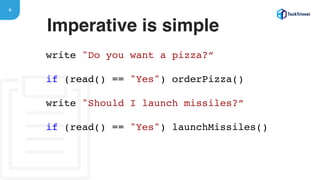












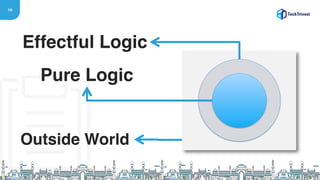




























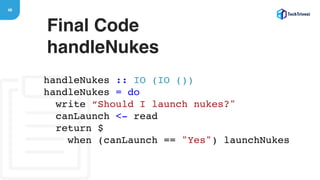
![49
Final Code
Combine flows together
join (handlePizza <> handleNukes <> ...)
join (mappend [ handlePizza
, handleNukes
...
])
Or Perhaps](https://image.slidesharecdn.com/superchargedimperativehaskellfp-191127110703/85/Supercharged-imperative-programming-with-Haskell-and-Functional-Programming-49-320.jpg)














